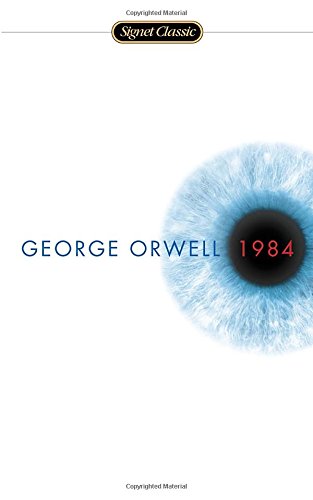All Nonfiction
- Bullying
- Books
- Academic
- Author Interviews
- Celebrity interviews
- College Articles
- College Essays
- Educator of the Year
- Heroes
- Interviews
- Memoir
- Personal Experience
- Sports
- Travel & Culture
All Opinions
- Bullying
- Current Events / Politics
- Discrimination
- Drugs / Alcohol / Smoking
- Entertainment / Celebrities
- Environment
- Love / Relationships
- Movies / Music / TV
- Pop Culture / Trends
- School / College
- Social Issues / Civics
- Spirituality / Religion
- Sports / Hobbies
All Hot Topics
- Bullying
- Community Service
- Environment
- Health
- Letters to the Editor
- Pride & Prejudice
- What Matters
- Back
Summer Guide
- Program Links
- Program Reviews
- Back
College Guide
- College Links
- College Reviews
- College Essays
- College Articles
- Back
Nineteen Eighty-Four by George Orwell
In the novel 1984 by George Orwell, Orwell creates a prediction from three decades prior of what he believes the year nineteen eighty-four will look like. Oceania is a dystopian society that is controlled by a state of constant fear to instill compliance with the Party. Winston Smith is a nobody who is angered by this society and has a sense of rebellion. He begins to do little acts of rebellion, thoughtcrime being the worst of them all. Eventually, Winston moves on to bigger and better rebellious acts. No matter how small the act, Big Brother knows. Ultimately, the Party wins and Winston does not change this society in any way. In a way, Winston goes through many changes, but in the end everything stays the same as if his rebellion did not happen. The cliche “The more things change the more things stay the same” supports the novel 1984 by George Orwell, because the society and the main character himself remains unchanged after many traumatic events.
Oceania is a totalitarian society of the future. This society is oppressive, controlling and manipulative. This society is oppressing a majority of its population, the proles. The proles are free from Big Brother’s ‘watching eye,’ but are completely ignorant to the fact that they are being taken advantage of. This ignorance allows these people to be happy and allows the government to avoid being overthrown by such a large group. An example of this ignorance that is promoted in propaganda throughout the cities is, “From where Winston stood it was just possible to read, picked out on its white face in elegant lettering, the three slogans of the Party:
WAR IS PEACE, FREEDOM IS SLAVERY, IGNORANCE IS STRENGTH” (Orwell 6). The society is also extremely manipulative in many ways. The government not only watches you every second of the day, but also controls history. The Party has complete control over what people believe about the past by doctoring past speeches and events in history. This control remains unchanged by Winston’s actions. This is one of the reasons why this novel supports the claim that “the more things change the more things stay the same.”
Throughout his life, Winston Smith always tests the waters with rebellion. He begins to have an affair but is ultimately caught and reprimanded for his actions. After his capture the Party begins to brainwash and torture Winston into believing the government’s version of the truth. He eventually gives into this torture and is now a subject of the Party. Winston does not change the way the Party handles rebels in any way. This was a small hiccup compared to what the Party has to deal with. To prove how the Party gains another victory is when Winston says, “He gazed up at the enormous face. Forty years it had taken him to learn what kind of smile was hidden beneath the dark moustache. O cruel, needless misunderstanding! O stubborn, self-willed exile from the loving breast! Two gin-scented tears trickled down the sides of his nose. But it was all right, everything was all right, the struggle was finished. He had won the victory over himself. He loved Big Brother” (Orwell 376).
The Party releases Winston into the world and he is no longer consumed by his feelings of rebellion. He loves Big Brother. The Party has ingrained this into his head and this will continue to happen. This is another one of the reasons why this novel supports the claim that “the more things change the more things stay the same.”
Overall, the novel 1984 by George Orwell supports the statement that “the more things change the more things stay the same” by how the society and the main character remain unchanged after many significant events. Although Winston Smith is frustrated by the rules he must follow, he does rebellious acts to please his own desires instead of doing actions that will help reform his society. To top it all off, Winston gives into his society and becomes who they want, a person who will not have thoughts against the Party. This truly does stick to the saying because the more his life changes, the more forced he is back into his old ways, before the thought of rebellion.
Similar Articles
JOIN THE DISCUSSION
This article has 0 comments.

